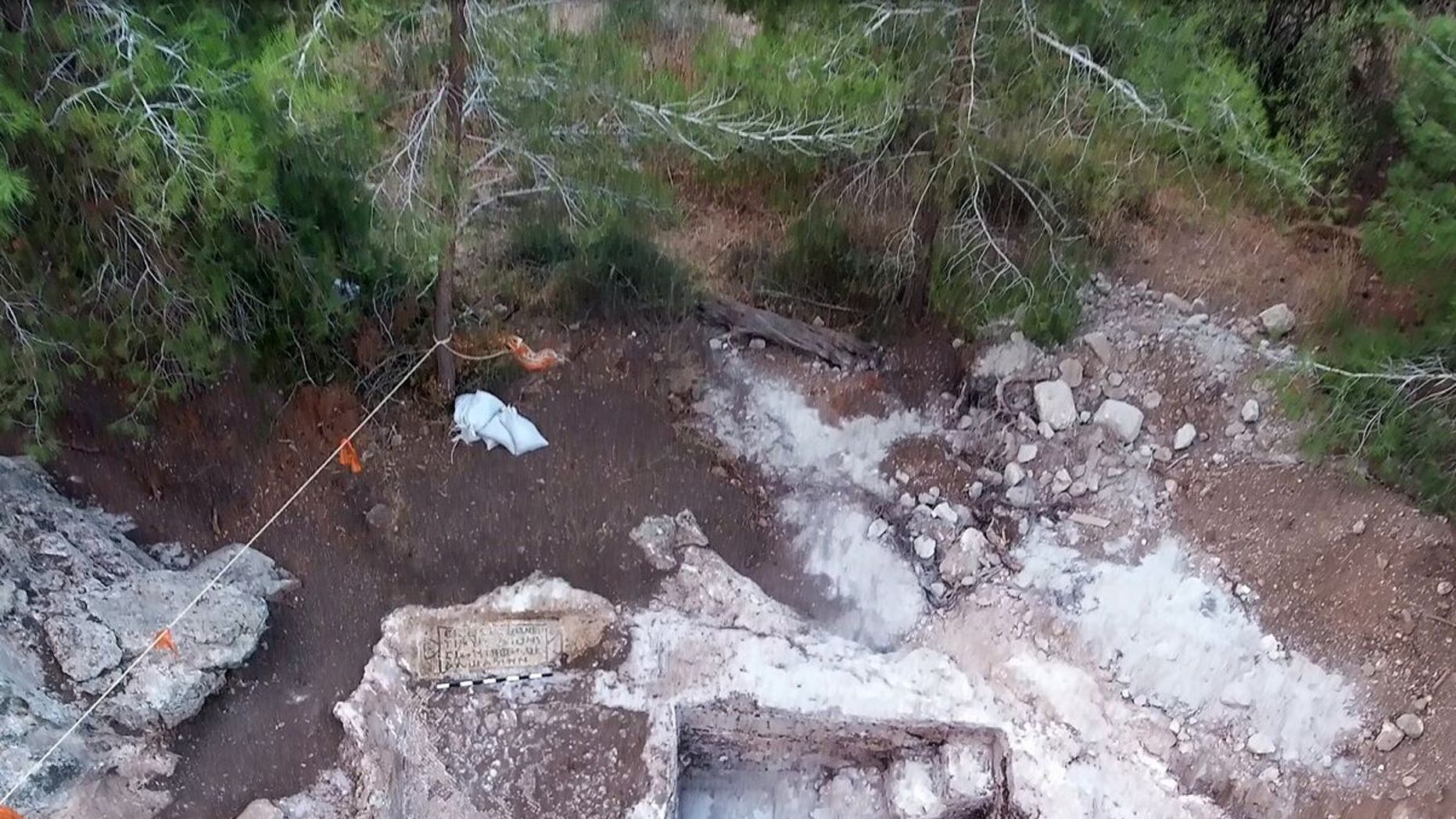
The inscription was discovered in an impressive winepress. (Yitzhak Marmelstein, Israel Antiquities Authority)
Archaeologists have discovered the estate of a wealthy ancient Samaritan at Zur Natan in central Israel.
A Greek inscription reveals that the agricultural property belonged to a man named “Adios,” who was a member of the ancient Samaritan religious group. “Only God help the beautiful property of Master Adios, amen,” it reads.
“The inscription was discovered in an impressive winepress that was apparently part of the agricultural estate of a wealthy individual called Adios,” explained Dr. Hagit Torge, who led the excavation for the Israel Antiquities Authority, in a statement. “This is only the second such winepress discovered in Israel with a blessing inscription associated with the Samaritans.”
ARCHAEOLOGISTS SHED NEW LIGHT ON BIBLICAL SITE LINKED TO THE ARK OF THE COVENANT
Translated by Prof. Leah Di Segni of the Hebrew University in Jerusalem, the inscription has been dated to the fifth century, a time when the Samaritan community was thriving in the area.
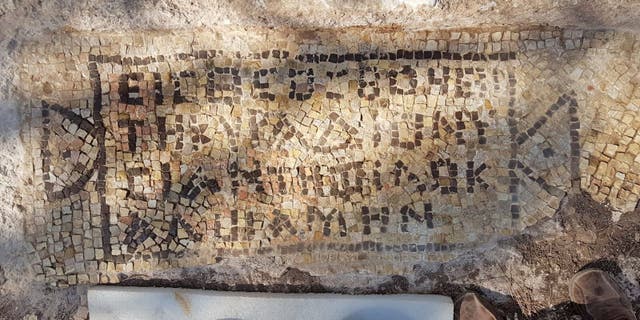
The inscription discovered during the excavation. (Photo: Galeb Abu Diab. Israel Antiquities Authority)
In addition to the winepress, archaeologists also discovered stone quarries with rock-cut depressions for cultivating grapevines.
"Master" was an honorific given to senior members of the community and attests to the high social standing of the owners of the estate,” said Torge. “The location of the winepress is near the top of Tel Zur Natan, where remains of a Samaritan synagogue were found with another inscription, and reveals Adios' high status.”
'JESUS' FACE' UNCOVERED AT ANCIENT CHURCH IN THE ISRAELI DESERT
Experts note that the area’s Samaritan population shrunk after sixth-century revolts against Byzantine rule.
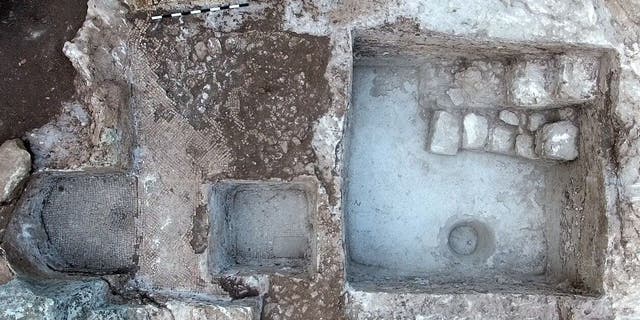
The estate once belonged to a man named "Adios." (Yitzhak Marmelstein, Israel Antiquities Authority)
A small community of Samaritans still lives at Mount Gerizim on the West Bank and in the Israeli city of Holon.
The ancient Samaritan estate is the latest fascinating archaeological discovery in Israel. In another project, archaeologists have been shedding new light on the history of a Biblical site linked to the Ark of the Covenant.
'SHIPS IN THE DESERT': STRANGE 2,000-YEAR-OLD GRAFFITI DISCOVERED IN ISRAEL
Engravings of ships were also recently found on an ancient water cistern discovered in a city in the Negev desert.
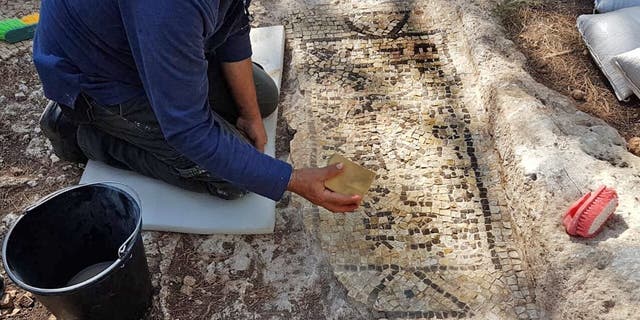
The inscription in Greek helped archaeologists work out the site’s history.
(Galeb Abu Diab. Israel Antiquities Authorty)
Elsewhere, archaeologists confirmed the first full spelling of “Jerusalem” on an ancient stone inscription excavated in the area of Jerusalem’s International Convention Center, known as Binyanei Ha'Uma.
In separate excavations, experts discovered a site that may offer fresh insight into the ancient biblical kingdom of David and Solomon, and a trove of bronze coins, the last remnants of an ancient Jewish revolt against the Roman Empire, near the Temple Mount in Jerusalem.
ANCIENT INSCRIPTION DISCOVERY THRILLS ARCHAEOLOGISTS IN ISRAEL
In February 2018, archaeologists announced the discovery of a clay seal mark that may bear the signature of the biblical Prophet Isaiah.
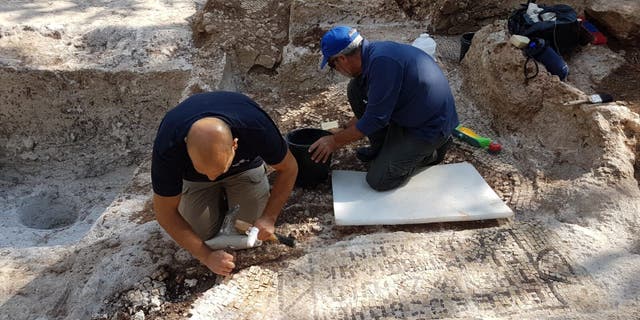
Archaeologists working on the ancient site.
(Photo: Galeb Abu Diab. Israel Antiquities Authority)
Other recent finds include the skeleton of a pregnant woman, dating back 3,200 years, in Israel’s Timna Valley, at a place once called King Solomon’s Mines.
At the site of an ancient city on the West Bank, archaeologists are also hunting for evidence of the tabernacle that once housed the Ark of the Covenant.
CLICK HERE TO GET THE FOX NEWS APP
Some experts also believe they have found the lost Roman city of Julias, formerly the village of Bethsaida, which was the home of Jesus' apostles Peter, Andrew and Philip.
Follow James Rogers on Twitter @jamesjrogers
Source: Read Full Article